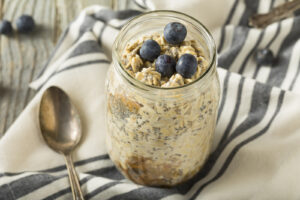Why Seniors Should Eat Oats- National Oat Month
January is designated National Oatmeal Month, proclaiming that the consumption of this grain may lead to positive health benefits. Enjoy oatmeal for breakfast and snacks throughout the month to show your support. This is something that a senior can participate in, and it may lead to health benefits they were unaware of. Oats are also something that is easy to make, so if your elderly loved one has senior home care helping them around the house, this can be an easy meal to prepare.
Benefits of Eating Oats

Senior Home Care Arlington, VA: National Oat Month
Oatmeal has gained popularity due to its reputation for reducing cholesterol and relieving skin irritation. Steel-cut oats are delicious and nutritious and may even improve your health. Rolled oats are the best option if you want softer oats in a shorter amount of time.
Oats Can Help Maintain Weight
Many people don’t realize that oatmeal is great for weight loss since it makes you feel full for a longer period. This nutritious whole grain has a high fiber content, helping you feel full sooner. This aids weight loss by preventing overeating and excessive snacking and decreasing overall calorie consumption. Even if they’re not focused on weight loss, it can be a good meal if they want to have a stable weight during their senior years.
Oats Helps With Blood Sugar Levels
Due to its slow digestion, blood sugar levels are better maintained with the aid of oatmeal. Those monitoring their weight may also benefit from this: morning oatmeal keeps you full longer than most other meals. That’s why swapping in oatmeal for white bread or other high-calorie items is a great way to cut calories and curb hunger pangs throughout the day. As a high-fiber food, oats may also help you feel full and control your appetite throughout the day. Oatmeal’s high fiber content means a more measured introduction of glucose to the bloodstream. This aids in preventing the glucose spikes that might occur after consuming processed carbs and helps keep glucose levels steady.
Oats Are Filled with Antioxidants
Antioxidants like those found in oatmeal (phytic acid, vitamin E, phenolic compounds, and Avenanthramides) help reduce swelling, stop stinging, and increase blood circulation. These antioxidants also rid the body of free radicals, which may prevent oxidative stress and the resulting cell damage and eventual chronic illness. This is a great start to the day or even a midday snack for seniors who get hungry throughout the day.
Oats Can Help Improve Blood Pressure
The danger of developing cardiovascular disease and a stroke is greatly amplified when blood pressure is consistently high. Oatmeal contains the antioxidant avenanthramides, which has been found to boost nitric oxide synthesis, resulting in blood vessel dilation, relaxation, and a subsequent reduction in blood pressure. If you’re having difficulties consuming enough fiber, consider adding additional whole grains to your diet, such as oatmeal, for breakfast. This is something that senior home care can help with in the mornings.
Oats Can Help a Senior Sleep
Most people eat oatmeal in the mornings but eating some before bed might improve your rest at night. Tryptophan is found in oatmeal and is converted into melatonin, which controls your body’s sleep-wake cycle. The body produces more melatonin in the evening as a warning that sleep is approaching. However, exposure to light suppresses melatonin synthesis, alerting the mind and body to the time of day. Both magnesium and calcium are present in oatmeal and have been linked to better sleep quality.
If you or an aging loved-one is considering Senior Home Care in Arlington, VA please contact the caring staff at Butters Home Health Care today. (703) 371-2113
